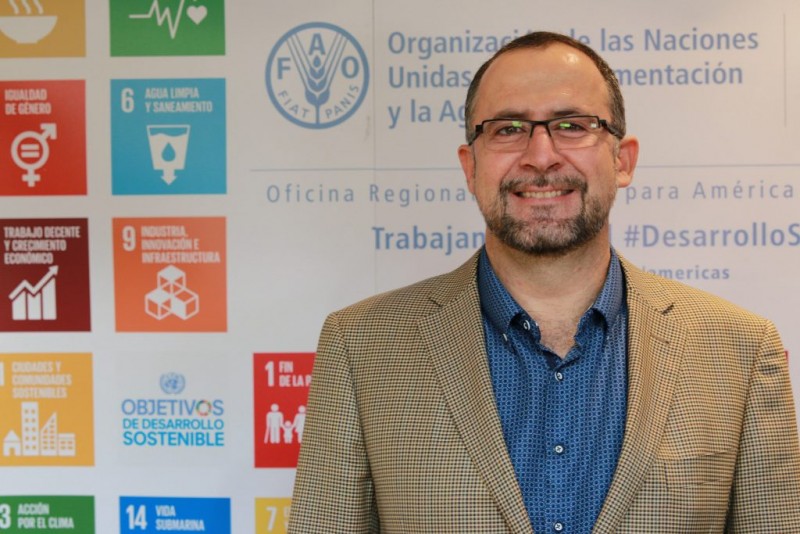Rafael Zavala comments on the creation of the RAES trilingual platform and states that school feeding is key to transform food culture and food systems
Paulo Beraldo
Transcending regional boundaries and promoting school feeding as a game-changer in transforming food systems and improving food culture. By intensifying the exchange of information and experiences, FAO Representative in Brazil, Rafael Zavala, believes that the new RAES platform will be essential to expand the scope of discussions on school feeding in Latin America and the Caribbean.
“With these three languages, we cover practically the entire American continent, which, by the way, is the most obese continent on the planet. School feeding should play a major role in combating obesity and other forms of malnutrition”, he says on this interview for RAES platform.

What is the importance of developing and publicizing a platform available in three languages: Portuguese, Spanish and English?
RAES platform is very welcome because it makes the most innovative and relevant school feeding events in our region even more accessible in one place. It is an action that, without a doubt, institutionally strengthens the technicians of the countries so that they find a space for exchanging information, experiences and good practices. They will also have a space – the Dialogue Forum – where people can share opinions and participate in the debates.
So I believe the keyword for this platform is accessibility. Most Latin American countries speak Spanish, but the other two languages mean even more representation. On the one hand, from the most populous country in the region – Brazil – and, on the other, from more than a dozen English-speaking Caribbean countries. Furthermore, with these three languages, we cover practically the entire American continent, which by the way is the most obese continent on the planet and school feeding must play a big role in combating obesity and other forms of malnutrition.
What does this new step represent for theBrazil-FAO Cooperation in school feeding mean?
I believe that it constitutes a new stage of International Cooperation in school feeding, as it materializes and consolidates the work carried out in recent years to strengthen these policies at the regional level, through the work of the National Fund for Educational Development (FNDE/MEC), the Brazilian Cooperation Agency (ABC/MRE) and the Food and Agriculture Organization (FAO).
Here I would say the keyword is scope. This platform will provide greater potential for expanding events and exchanging information and experiences in the region. What were once physical materials, with limited scope and consequent use of paper, will now be digital communication materials, in three languages, with replication potential and reach never seen before.
You often say that we need to transform school feeding into a ‘game changer’. How does the platform, by providing visibility and strengthening the structure of the network, contribute to this objective?
When I say school feeding must be a game-changer, I mean it must be placed at the center of high-level public debate about transforming food systems and changing our food culture. It is becoming increasingly clear that our challenge is to transform agrifood systems. This is FAO’s vision. Transform food systems for better production, better nutrition, better environment and better quality of life. We say at FAO that these are the four betters.
School feeding is a powerful political tool to build and promote a new, healthier and more sustainable food culture, so that we can have more time to know where food comes from and the effects on our health. We have to be much more informed about what we have on the table. School feeding, through food and nutrition education actions, certainly paves the way in that direction. In this way, school feeding can be a watershed, transforming food systems and, through the promotion of healthy food environments in schools, being a fundamental element to improve the food culture of children and their families.
In your view, what will be the best results that this platform will bring over time?
The best results of this platform would be a greater commitment of the countries of Latin America and the Caribbean and also of other regions of the planet in our dialogues, exchanges and construction of knowledge. Countries and managers can and will recognize each other in the experiences, challenges and solutions found, no matter what region they are in. This platform, with adequate monitoring and planning, will certainly transcend regional borders and soon we will be able to talk about an intercontinental platform to promote school feeding as a watershed in the transformation of food systems and change in food culture.







